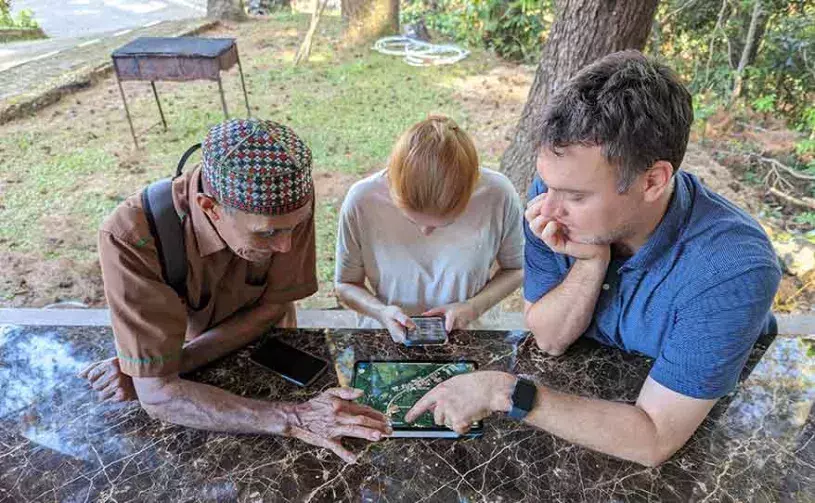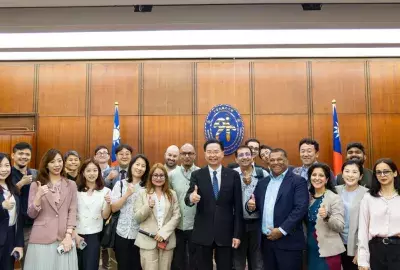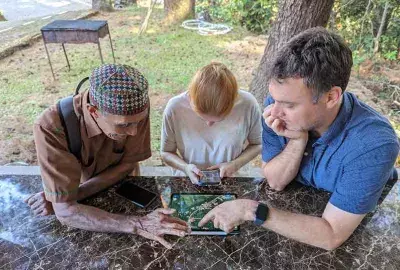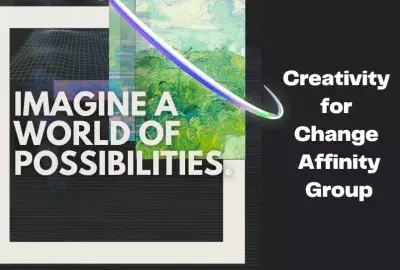Error message

OFFICE/DEPARTMENT
Earth Day is a moment to reflect on our planet and the steps we're taking to preserve it. At the East-West Center, fostering environmental solutions is a key pillar of our strategic plan. We're not just talking about solutions; we're actively working to be a regional hub for environmental expertise and collaborative action, aiming to improve ecosystem health, mitigate climate change, and foster human resilience.
EWC research projects across the Asia-Pacific region showcase the breadth of the Center’s efforts. We recognize that addressing environmental challenges requires diverse perspectives and methods that attend to the contextual nature of these problems, and which remain sensitive to the needs of communities who are affected by these issues.
In our climate efforts in the Pacific, we're using data-driven approaches to combat drought, grounded in climate science and collaborating closely with stakeholders. We’re also working with the US National Oceanographic and Atmospheric Administration (NOAA) on interdisciplinary research and partnerships across the Pacific to engage communities, governments, and businesses in developing effective policies to build resilience in key sectors such as water-resource management, coastal and marine resources, fisheries, agriculture, tourism, disaster management, and public health.
In South and Southeast Asia, we're amplifying community voices to build climate resilience, highlighting initiatives showing how climate change is closely intertwined with issues around community-based natural resource management. Meanwhile, our work on vulnerable deltas in Southeast Asia sheds light on the multifaceted impacts of climate change.
Climate change isn't the only issue on our radar. We're also tackling pollution head-on, from assessing clean cooking solutions in Micronesia to monitoring chemical and heavy metal residues in the aftermath of the wildfire that destroyed Lahaina, Maui in August 2023.
Through these initiatives, we're not only deepening our understanding of the complex dynamics underlying environmental challenges but also forging partnerships across the region. From knowledge exchanges to capacity-building, we're committed to engaging diverse stakeholders and sharing our findings with the wider community.
As we mark Earth Day, let's remember that addressing the complex environmental challenges that we collectively face today requires collaboration, innovation, and a focus on local communities.
Earth Day is a moment to reflect on our planet and the steps we're taking to preserve it. At the East-West Center, fostering environmental solutions is a key pillar of our strategic plan. We're not just talking about solutions; we're actively working to be a regional hub for environmental expertise and collaborative action, aiming to improve ecosystem health, mitigate climate change, and foster human resilience.
EWC research projects across the Asia-Pacific region showcase the breadth of the Center’s efforts. We recognize that addressing environmental challenges requires diverse perspectives and methods that attend to the contextual nature of these problems, and which remain sensitive to the needs of communities who are affected by these issues.
In our climate efforts in the Pacific, we're using data-driven approaches to combat drought, grounded in climate science and collaborating closely with stakeholders. We’re also working with the US National Oceanographic and Atmospheric Administration (NOAA) on interdisciplinary research and partnerships across the Pacific to engage communities, governments, and businesses in developing effective policies to build resilience in key sectors such as water-resource management, coastal and marine resources, fisheries, agriculture, tourism, disaster management, and public health.
In South and Southeast Asia, we're amplifying community voices to build climate resilience, highlighting initiatives showing how climate change is closely intertwined with issues around community-based natural resource management. Meanwhile, our work on vulnerable deltas in Southeast Asia sheds light on the multifaceted impacts of climate change.
Climate change isn't the only issue on our radar. We're also tackling pollution head-on, from assessing clean cooking solutions in Micronesia to monitoring chemical and heavy metal residues in the aftermath of the wildfire that destroyed Lahaina, Maui in August 2023.
Through these initiatives, we're not only deepening our understanding of the complex dynamics underlying environmental challenges but also forging partnerships across the region. From knowledge exchanges to capacity-building, we're committed to engaging diverse stakeholders and sharing our findings with the wider community.
As we mark Earth Day, let's remember that addressing the complex environmental challenges that we collectively face today requires collaboration, innovation, and a focus on local communities.







